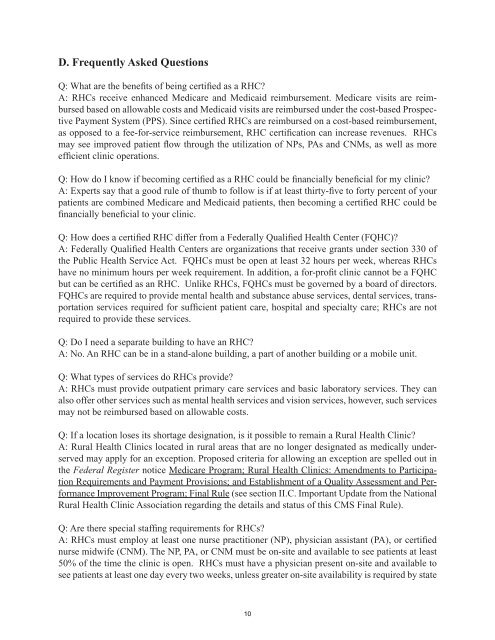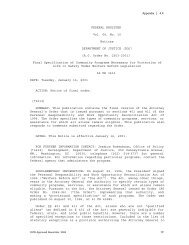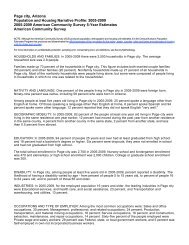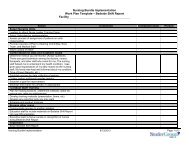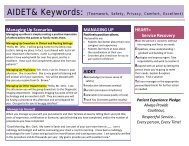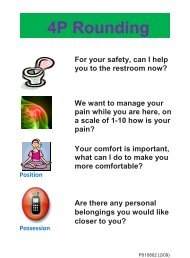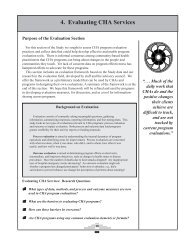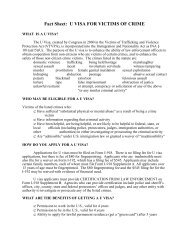Arizona Rural Health Clinic Designation Manual - Arizona Center for ...
Arizona Rural Health Clinic Designation Manual - Arizona Center for ...
Arizona Rural Health Clinic Designation Manual - Arizona Center for ...
Create successful ePaper yourself
Turn your PDF publications into a flip-book with our unique Google optimized e-Paper software.
D. Frequently Asked Questions<br />
Q: What are the benefits of being certified as a RHC<br />
A: RHCs receive enhanced Medicare and Medicaid reimbursement. Medicare visits are reimbursed<br />
based on allowable costs and Medicaid visits are reimbursed under the cost-based Prospective<br />
Payment System (PPS). Since certified RHCs are reimbursed on a cost-based reimbursement,<br />
as opposed to a fee-<strong>for</strong>-service reimbursement, RHC certification can increase revenues. RHCs<br />
may see improved patient flow through the utilization of NPs, PAs and CNMs, as well as more<br />
efficient clinic operations.<br />
Q: How do I know if becoming certified as a RHC could be financially beneficial <strong>for</strong> my clinic<br />
A: Experts say that a good rule of thumb to follow is if at least thirty-five to <strong>for</strong>ty percent of your<br />
patients are combined Medicare and Medicaid patients, then becoming a certified RHC could be<br />
financially beneficial to your clinic.<br />
Q: How does a certified RHC differ from a Federally Qualified <strong>Health</strong> <strong>Center</strong> (FQHC)<br />
A: Federally Qualified <strong>Health</strong> <strong>Center</strong>s are organizations that receive grants under section 330 of<br />
the Public <strong>Health</strong> Service Act. FQHCs must be open at least 32 hours per week, whereas RHCs<br />
have no minimum hours per week requirement. In addition, a <strong>for</strong>-profit clinic cannot be a FQHC<br />
but can be certified as an RHC. Unlike RHCs, FQHCs must be governed by a board of directors.<br />
FQHCs are required to provide mental health and substance abuse services, dental services, transportation<br />
services required <strong>for</strong> sufficient patient care, hospital and specialty care; RHCs are not<br />
required to provide these services.<br />
Q: Do I need a separate building to have an RHC<br />
A: No. An RHC can be in a stand-alone building, a part of another building or a mobile unit.<br />
Q: What types of services do RHCs provide<br />
A: RHCs must provide outpatient primary care services and basic laboratory services. They can<br />
also offer other services such as mental health services and vision services, however, such services<br />
may not be reimbursed based on allowable costs.<br />
Q: If a location loses its shortage designation, is it possible to remain a <strong>Rural</strong> <strong>Health</strong> <strong>Clinic</strong><br />
A: <strong>Rural</strong> <strong>Health</strong> <strong>Clinic</strong>s located in rural areas that are no longer designated as medically underserved<br />
may apply <strong>for</strong> an exception. Proposed criteria <strong>for</strong> allowing an exception are spelled out in<br />
the Federal Register notice Medicare Program; <strong>Rural</strong> <strong>Health</strong> <strong>Clinic</strong>s: Amendments to Participation<br />
Requirements and Payment Provisions; and Establishment of a Quality Assessment and Per<strong>for</strong>mance<br />
Improvement Program; Final Rule (see section II.C. Important Update from the National<br />
<strong>Rural</strong> <strong>Health</strong> <strong>Clinic</strong> Association regarding the details and status of this CMS Final Rule).<br />
Q: Are there special staffing requirements <strong>for</strong> RHCs<br />
A: RHCs must employ at least one nurse practitioner (NP), physician assistant (PA), or certified<br />
nurse midwife (CNM). The NP, PA, or CNM must be on-site and available to see patients at least<br />
50% of the time the clinic is open. RHCs must have a physician present on-site and available to<br />
see patients at least one day every two weeks, unless greater on-site availability is required by state<br />
10


